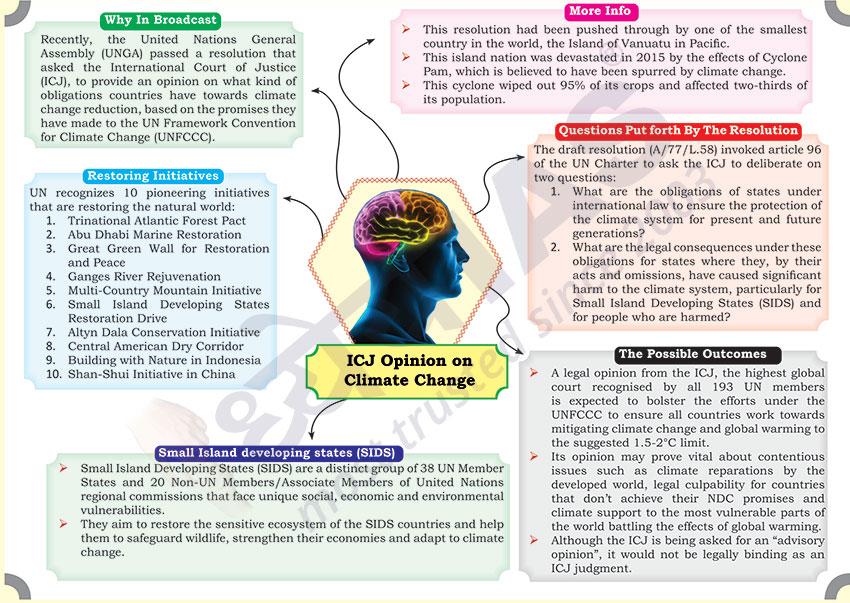Brain-booster /
27 Apr 2023
Brain Booster for UPSC & State PCS Examination (Topic: ICJ Opinion on Climate Change)

Why in Broadcast?
- Recently, the United Nations General Assembly (UNGA) passed a resolution
that asked the International Court of Justice (ICJ), to provide an opinion
on what kind of obligations countries have towards climate change reduction,
based on the promises they have made to the UN Framework Convention for
Climate Change (UNFCCC).
More Info
- This resolution had been pushed through by one of the smallest country
in the world, the Island of Vanuatu in Pacific.
- This island nation was devastated in 2015 by the effects of Cyclone Pam,
which is believed to have been spurred by climate change.
- This cyclone wiped out 95% of its crops and affected two-thirds of its
population.
Questions Put forth By The Resolution
- The draft resolution (A/77/L.58) invoked article 96 of the UN Charter to
ask the ICJ to deliberate on two questions:
- What are the obligations of states under international law to ensure
the protection of the climate system for present and future generations?
- What are the legal consequences under these obligations for states
where they, by their acts and omissions, have caused significant harm to
the climate system, particularly for Small Island Developing States
(SIDS) and for people who are harmed?
The Possible Outcomes
- A legal opinion from the ICJ, the highest global court recognised by all
193 UN members is expected to bolster the efforts under the UNFCCC to ensure
all countries work towards mitigating climate change and global warming to
the suggested 1.5-2°C limit.
- Its opinion may prove vital about contentious issues such as climate
reparations by the developed world, legal culpability for countries that
don’t achieve their NDC promises and climate support to the most vulnerable
parts of the world battling the effects of global warming.
- Although the ICJ is being asked for an “advisory opinion”, it would not
be legally binding as an ICJ judgment.
Small Island developing states (SIDS)
- Small Island Developing States (SIDS) are a distinct group of 38 UN
Member States and 20 Non-UN Members/Associate Members of United Nations
regional commissions that face unique social, economic and environmental
vulnerabilities.
- They aim to restore the sensitive ecosystem of the SIDS countries and
help them to safeguard wildlife, strengthen their economies and adapt to
climate change.
Restoring Initiatives
- UN recognizes 10 pioneering initiatives that are restoring the natural
world:
- Trinational Atlantic Forest Pact
- Abu Dhabi Marine Restoration
- Great Green Wall for Restoration and Peace
- Ganges River Rejuvenation
- Multi-Country Mountain Initiative
- Small Island Developing States Restoration Drive
- Altyn Dala Conservation Initiative
- Central American Dry Corridor
- Building with Nature in Indonesia
- Shan-Shui Initiative in China








